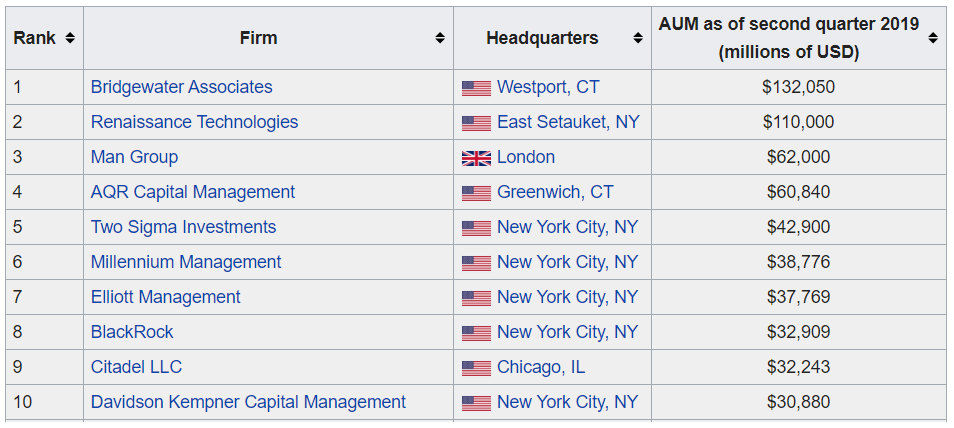‘A monkey could do this job’.
No, not the job of being an investor at a hedge fund or doing hedge fund internships, but the job of being a junior analyst at one of the big banks on Wall Street.
That’s what an Ivy League graduate notoriously said.
Evidently, he left the entire banking and investment world in an uproar, as who could have been so bold as to utter this? However, as it turns out, he might have been right.
It’s a very well-known fact in the investment world that every junior out there who wants to claim a job with a great bank needs to go through a so-called ‘rite of passage’.
Traditionally, given the fact that most Wall Street banks are old, famous, and very well-positioned, this rite of passage meant spending a few years as a junior banker with one of them.
The only thing is that young candidates seem to have had enough of that lately and decided they are just a tad too qualified for spending so many years in such a menial position.
The solution? Most of them are now slowly, quietly, but surely turning to hedge fund graduate jobs.

If you’re one of them and believe this is the path for you too, here’s your essential guide to graduate hedge fund jobs. Keep on reading for details on:
- How to land an internship,
- The work you’ll be doing on a daily basis,
- Salary expectations,
- Which are the top hedge funds, and
- What 2020-21 have in store for them
What is a hedge fund?
Simply to be on the same page, let’s review quickly the ins and outs of what a hedge fund is and how it works. The simplest possible way to define a hedge fund is that:
It’s a company who uses its clients’ money in order to invest in alternative funds. They do this either to beat the market or to create a hedge against unexpected changes in the market.
The hedge fund in itself is structured as a limited partnership. Also, from a legal point of view, it’s quite similar to an investment strategy.
It charges its clients more or less the same fees, too.
The hedge fund acts as the general partner, while third parties, such as banks, pension funds, and wealthy individuals act as the third party, the limited one, in the limited partnership that is the hedge fund.
The third-party provides the money and the hedge fund invests it away.
The manner in which it does that is of real interest here. In the past few years, ever since the financial crisis that hit on a global scale, hedge funds have found themselves under a great deal of scrutiny.
It seems as though a select few hedge funds have amassed billions by betting against the sub-prime housing market.
They did so while millions of Americans lost their jobs and, subsequently, their homes.
This, in turn, leads to discontinuation between Main Street American and Wall Street Hedge Funds.
However, it’s important to note that these are only a few bad apples and that there’s nothing wrong with hedge funding per se.
This niche has its wrongdoers just like any other business does.

The recruiting process for a hedge fund internship
This is, probably, the most important thing you need to know. As many, if not all seniors will tell you, interviewing for both an internship and a job at a hedge fund is very difficult.
In fact, it’s a lot more difficult and extended than any other investment bank interview out there. Here is all you need to know in order to ace it.
First of all, be prepared for case studies.
In addition to the interview or interviews themselves, they might very well give you a case-study or two for you to work on for a few days.
The reason is simple enough.
No interviewer, no matter how good an HR person he or she is, can tell how you will act as an employee after a mere 30 minutes’ discussion.
They need to see how you will be on the job. This is where the case study comes in.
Another good thing for you to know and be prepared for is that there are 2 types of case studies you will receive during your interview for the hedge fund internship:
- The type you may take home with you – for which you receive a few days or up to a week to solve
- The type you need to solve on the spot – you will get 1 or 2 hours to do it and you will need to make a presentation afterward!! Therefore, work on your presenting skills as well, not just your case-study solving ones. If needed, do some role-playing with a friend the night before.
What you need to always keep in mind is that the case study is the real deal-breaker here. If you cannot solve it the way they expect you to, you will not get an offer.
Also important in the interview for a hedge fund internship front are the questions.
Here are the 4 most common questions candidates receive, as listed by an investor who worked almost ten years in different hedge funds, until he retired early and left to go paragliding and travel the world.
Sounds rather good, doesn’t it? Indeed, it does, so, maybe, it’s a good idea for you to know how to answer these main questions he has pinpointed.
- Tell us about your background
- What is the reason why you want a job in a hedge fund?
- What stocks do you like?
- Have you done any investing lately and, if so, what kind?
Do hedge funds offer internships to undergraduates?
Yes, they most surely do. However, it’s not very common, which means you have to work as hard as possible.
Usually, hedge funds, as well as investment and commercial banks hire people who have at least a few years’ experiences in the field.
But, if you follow these steps and work very hard, you might have a shot at it.
- Put together a list of funds where you feel you could fit in best. In order to do this, ask yourself a few questions, such as what is your personal investment strategy, your value, growth, and macro?
Apart from that, build the list itself by looking up hedge fund companies online, add the ones referenced in your school books and the ones pitched at investors’ conferences. - A good tip here is to start with small hedge fund companies. Simply cold call them, as they are a lot more likely to respond than the big ones.
- Create leverage for yourself. Why? Because you don’t have any experience and this will weigh you down as opposed to your older and more field-experienced counter candidates.
Try to match their knowledge and skillset by doing the following:
- write a compelling cover letter
- create yourself a very good resume, even though there’s nothing to put in there, except your college grades and your SAT scores (which matter a lot, as well)
- add two research notes, both on the long and short side that will demonstrate your ability to generate amazing ideas.

Where to find hedge fund internships?
As mentioned above, finding a hedge fund that offers summer internships is not difficult. Google is your best friend. Do a thorough search and create a top for yourself, based on several criteria.
- which are the hedge funds you would like to intern in most?
- Which are the ones you would like to intern in the least?
- Divide them into categories – small, medium, large – and start applying for the small ones. They are a lot more likely to answer and invite you to an interview.
- Recommended hedge funds vs. the ones which don’t have any online backup from employees or investors.
Second of all, if googling doesn’t render all the results you would like to see, then you can try specialized websites, as follows.
- LinkedIn – You will find an array of internships here, as well as jobs per se. Most of them are in New York City and in London, evidently, but there are others, even though less in number, in other states as well.
For example, you can find some in Houston, Texas, Stamford, Connecticut or Milwaukee, Wisconsin. - com – is a specialized website that allows you to browse through hedge fund internships and jobs by job title, company, sub-sectors, and location.
They also have great news, advice, and students’ section, which we advise you to keep your eye on. - indeed.com – this particular website even allows you to perform a search by salary estimate, in case you want to know how much money your future employer will offer you (for further details on salaries for hedge fund internships, see below).
In the same way, most internships and jobs are located in New York City, but the offers stretch all the way to the West Coast, in California. - Net – exactly as their website suggests, they are more than just a hedge fund database.
Apart from being able to find an internship or a job here, you will also be able to read the news, actually, learn about hedge funds, find out where all the conferences are and how you can attend, and which are the hedge fund service providers.

Hedge fund internships salary – is it everything it’s hyped to be?
Yes. And no.
Yes, because, indeed, hedge funds offer the biggest salaries in the finance market, including internships.
And no because it depends on the company you work for, the hours you put in, the school you come from, what grades you had, and the list can go on.
Actually, as far as salaries go, the hedge fund internship market varies so much that one company may offer no money at all, which means unpaid internship, while other companies are reported to pay as high as $30 per hour to an intern.
This basically translates into the fact that you need to discuss this matter with your employer.
However, keep in mind you are not doing a summer hedge fund internship for the money.
You are actually doing it to gain experience, fill up your resume with relevant information, and start your career. The money will come later on.
Nonetheless, for you to get an idea of how much a hedge fund analyst makes, you should know that the entry-level salary is somewhere between $90 000-$120 000.
It’s an absolutely outstanding sum to be paid for an entry-level job and that’s not even all. This average entry-level position is normally a combination of base and performance bonuses.
You should know that most hedge fund analysts are compensated according to performance.
This leads to the fact that the compensation is twice the base amount. It doesn’t follow any fixed benchmark and, as mentioned, it’s related to the fund performance.
Simply put, if a certain fund performs very well, the employees will receive amazing compensation. Yes, salaries are quite amazing in this niche in the finance market.
This means that your internship may very well be paid quite well. However, keep in mind what we stated above.
Even if your hedge fund internship isn’t paid, it’s still worth going for it. Think of all the money that follows as an incentive for you to push hard through an unpaid summer internship.
Here‘s the updated list of the wealthiest hedge fund managers.
Which are the top hedge funds?
According to Wikipedia:

Key Takeaway
As a conclusion and some final pieces of advice regarding hedge fund internships, before you go on to applying and participating in the interview, make sure this is, indeed, the right career path for you.
Not financing, but hedge funds.
You can also go for private equity and asset management internships.
The surer you are about your decision, the easier it will be for you to do all the work. After you’ve decided, become a true student of hedge funds.
Not just in college, but on your own as well.
Never rely solely on the financing education you’re received in college, even if you attended an Ivy League school. This is where the hedge fund internships come in.
Keep learning and keep working and you will get there.


